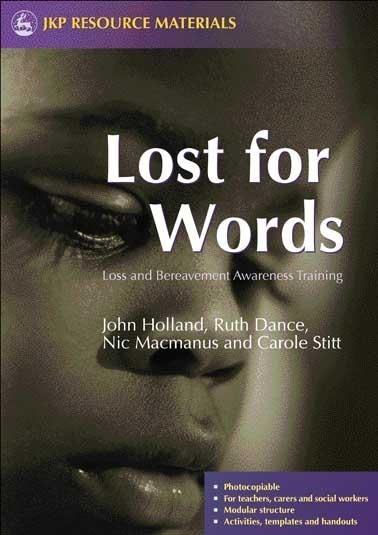
Press Reviews
Mortality
Lost for Words is a loss awareness package designed for trainers to guide those working, particularly in schools, in supporting children who have suffered bereavement or other major losses. The flexible modular structure of this resource means that a variety of sessions can be planned around trainees' needs. Group activities, including case studies, excellent templates for OHP transparencies, and handouts are clearly set out. Both anticipated and sudden death, cultural aspects, and loss response policies for schools are well covered. Of particular interest was the data on school responses to a bereaved child, whether teachers were approachable, and to whom children spoke about their feelings. Guidance is given on setting up a training session, making ground rules, and introducing useful icebreakers. There is a good section on children's learning behaviour, and main points for the trainer to emphasise in helping children. This is a valuable book for anyone who wishes to run courses on childhood loss and bereavement. There is a wealth of information to draw on, and this book could be useful aid in developing and running courses for those at the sharp end.
Leveson Newsletter
This book is a model of excellent practice both in theory and in its application to experience. This training package set out information in a clear and comprehensive way. Developed from collaborative multi-agency and multi-professional work with a range of professionals, the book is designed for use by trainers over the course of a day or several days. It is well organised into 21 sections providing trainers with a range of tools for awareness training. While focused upon children, their parents and schools, material is of direct relevance to all of us who wish to think about and reflect upon death and its meanings and practices in life. I think that much of this material could be adapted for use for training in care homes - it is stimulating, insightful, and wise but above all, practical. I was grateful for it during [a] particular crisis. What better commendation can a reviewer offer?
Climb Update
An excellent source of information regarding loss and bereavement. It is a "loss awareness" training package designed for teachers and carers supporting children who are experiencing bereavement and loss. It is designed for use by trainers over the course of a day or several days. It offers crucial guidance backed by research. Resources include templates, handouts and a bibliography. I covers how to use ice breakers, engagement, ground rules, confidentiality and materials needed. Feelings on the return to school, the school response. Feelings to do with loss i.e. anger, sadness, guilt, shock, disbelief, unhappiness, worry, fear and abandonment. How to write a life line, active models of loss using diagrams, death as taboo and covering death in the school community. This is so good, anyone dealing with young bereavement issues should read this. It is set out very simply, without jargon and should definitely be kept as a school resource.
Pastoral Care, March 2006
It is a welcome, clearly expressed and practical toll for teachers and those supporting children through loss and bereavement. Lost for Words is an intelligent and adaptable resource, thoughtfully presented. The guidance that it offers to teachers, social workers, psychologists and nurses is invaluable.
